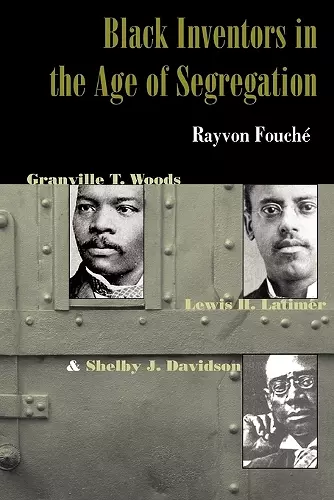Black Inventors in the Age of Segregation
Granville T. Woods, Lewis H. Latimer, and Shelby J. Davidson
Format:Paperback
Publisher:Johns Hopkins University Press
Published:28th Oct '05
Currently unavailable, and unfortunately no date known when it will be back

Fouche vividly captures the real lives of black inventors, defining and cutting through obscuring myths and ideologies. Black Inventors in the Age of Segregation forces us to rethink contentious issues of race, technology, and invention. -- Arthur Molella, director of Lemelson Center for the Study of Invention and Innovation, Smithsonian Institution
Describes the struggles of three African American men who try to balance racial identity with a desire to be judged solely on the merit of their inventive work. This book provides a nuanced view of African American contributors to technology during a period of rapid industrialization.According to the stereotype, late-nineteenth and early-twentieth-century inventors, quintessential loners and supposed geniuses, worked in splendid isolation and then unveiled their discoveries to a marveling world. Most successful inventors of this era, however, developed their ideas within the framework of industrial organizations that supported them and their experiments. For African American inventors, negotiating these racially stratified professional environments meant not only working on innovative designs but also breaking barriers. In this pathbreaking study, Rayvon Fouche examines the life and work of three African Americans: Granville Woods (1856-1910), an independent inventor; Lewis Latimer (1848-1928), a corporate engineer with General Electric; and Shelby Davidson (1868-1930), who worked in the U.S. Treasury Department. Detailing the difficulties and human frailties that make their achievements all the more impressive, Fouche explains how each man used invention for financial gain, as a claim on entering adversarial environments, and as a means to technical stature in a Jim Crow institutional setting. Describing how Woods, Latimer, and Davidson struggled to balance their complicated racial identities-as both black and white communities perceived them-with their hopes of being judged solely on the content of their inventive work, Fouche provides a nuanced view of African American contributions to-and relationships with-technology during a period of rapid industrialization and mounting national attention to the inequities of a separate-but-equal social order.
Fouche takes an interesting and challenging approach to examining the lives of three black inventors... In debunking some of the myths, including financial success and race pride, Fouche humanizes them and examines the greater significance of their work in the context of American sociological and commercial history. Booklist 2003 Meticulously researched and well written... Readable, interesting, and highly recommended. Fouche is to be commended for reuniting the humanity of a neglected group of inventors with their better-known inventions. -- Michael N. Geselowitz IEEE Spectrum Magazine 2004 Thoughtful and interesting, this book provides useful new insights into invention in the U. S. at the dawn of the electrical age. -- Antony Anderson New Scientist Granville Woods patented devices as diverse as a steam boiler furnace and an electric incubator. Shelby Davidson strove to improve efficiency at the U.S. Treasury by inventing adding machines. Lewis Latimer co-patented a train-car lavatory and several improvements to electric lamp design. Historian Rayvon Fouche documents the struggles of these early black inventors and dismantles several myths surrounding their lives. Discover 2003 Fouche documents the struggles of these black inventors and dismantles several myths surrounding their lives. -- William Pretzer Technology and Culture 2004 Refutes the common notion that inventors were lone geniuses who worked in relative isolation in the late 19th-early 20th century world. The Bookwatch 2004
ISBN: 9780801882708
Dimensions: 229mm x 152mm x 16mm
Weight: 318g
242 pages